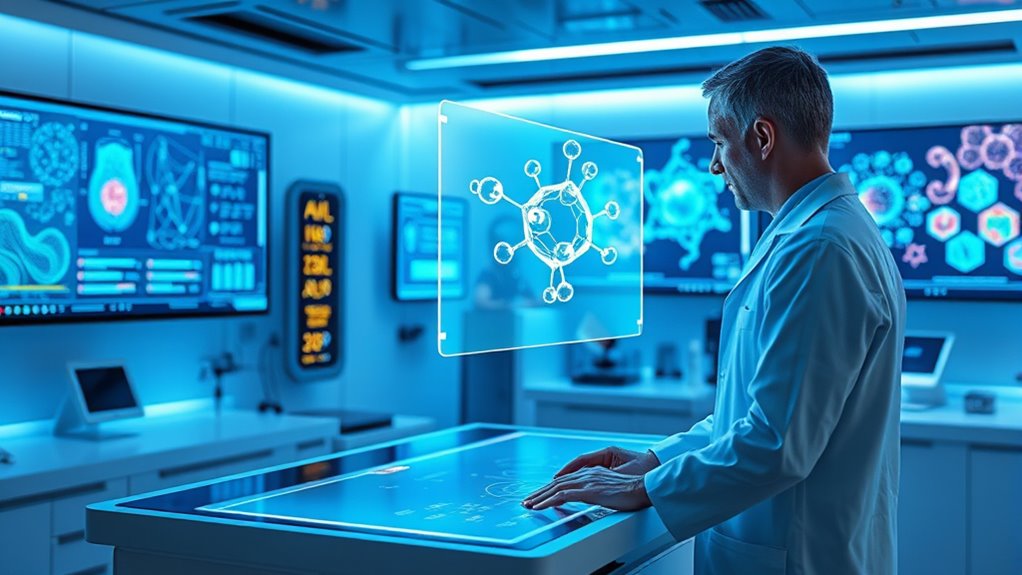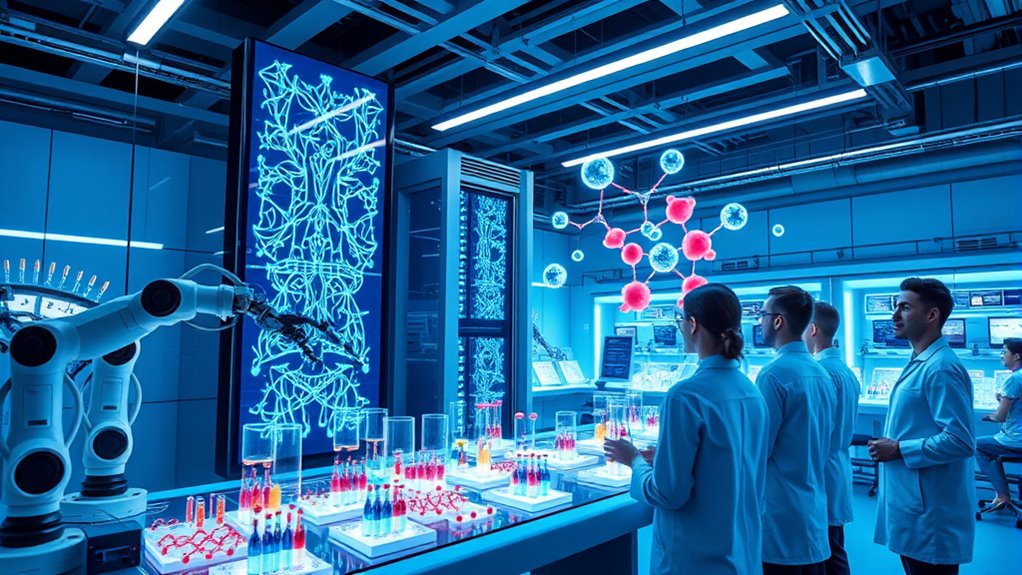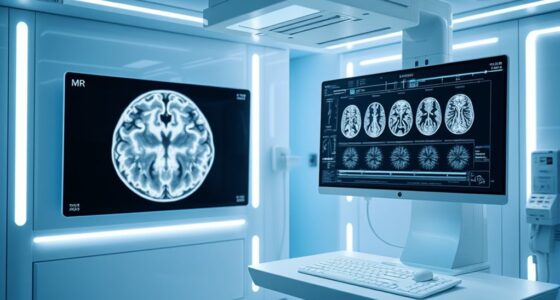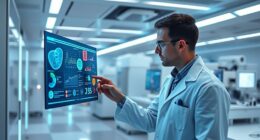In 2025, AI-driven drug discovery is making breakthroughs by enabling faster, more accurate identification of promising compounds and personalized treatments. AI algorithms analyze vast datasets, helping you develop therapies tailored to individual genetic profiles. Regulatory challenges are evolving, with agencies working to guarantee safety and transparency. As AI continues to advance, it’s shaping a future of more effective, personalized medicine—something you’ll see unfold as new innovations emerge. Keep exploring to understand how this transformation is happening.
Key Takeaways
- AI models will identify novel drug candidates faster, reducing development timelines significantly in 2025.
- Enhanced personalized treatments will be commonplace, leveraging AI to tailor therapies based on genetic profiles.
- Regulatory frameworks will evolve, adopting new validation and transparency standards for AI-driven discoveries.
- AI will improve clinical trial targeting, increasing efficiency and success rates for new therapies.
- Collaboration between AI developers and regulators will ensure safe, ethical, and effective adoption of breakthroughs.

Advancements in AI are revolutionizing how we discover new drugs, enabling researchers to identify promising compounds faster and more accurately than ever before. With AI-driven algorithms sifting through massive datasets, you’re now able to pinpoint potential therapies tailored to individual patients’ genetic profiles. This shift toward personalized medicine means treatments are no longer one-size-fits-all but are customized based on a person’s unique biology, improving efficacy and reducing adverse effects. AI models analyze genetic, proteomic, and clinical data to predict how different patients will respond to specific drugs, making clinical trials more targeted and efficient. This approach accelerates the development timeline, bringing life-saving treatments to market sooner. Moreover, the integration of machine learning techniques enhances the predictive power of these models, further refining drug discovery processes.
AI accelerates drug discovery by enabling personalized therapies tailored to individual genetic profiles, making treatments more effective and precise.
However, as your reliance on AI deepens, you must navigate complex regulatory challenges. Agencies like the FDA and EMA are still adapting their frameworks to accommodate AI-based drug discovery processes. Unlike traditional development, where clear protocols exist, AI models evolve rapidly, often functioning as “black boxes” whose decision-making processes aren’t always transparent. This raises questions about safety, efficacy, and reproducibility—key concerns regulators must address before approving AI-identified therapies. You need to ensure that AI tools meet rigorous standards for validation, interpretability, and consistency to gain regulatory approval. This often involves developing new testing protocols, validation datasets, and ongoing monitoring systems to track AI performance over time.
The regulatory landscape is becoming more nuanced, demanding transparency and accountability from AI developers. You might find yourself working closely with regulatory bodies to establish guidelines that balance innovation with patient safety. This collaboration ensures that AI-driven discoveries are not only scientifically sound but also ethically and legally compliant. The challenge lies in keeping pace with rapid technological advancements while maintaining rigorous oversight. As AI continues to evolve, so will the regulatory frameworks, requiring you to stay informed and adaptable.
Despite these hurdles, the integration of AI in drug discovery holds immense promise. It enables a more personalized approach to medicine, increasing the likelihood of successful treatments tailored to individual needs. At the same time, overcoming regulatory challenges is essential to ensure these innovations are safe and accessible to patients worldwide. Your role in this landscape involves not just leveraging groundbreaking AI tools but also actively participating in shaping policies that keep pace with technological progress. Ultimately, the synergy of AI innovation and regulatory foresight will define the future of effective, personalized therapies in 2025 and beyond.
Frequently Asked Questions
How Does AI Improve Drug Safety Testing Processes?
You can see AI improve drug safety testing by using predictive modeling to identify potential adverse effects early. It also streamlines data integration from various sources, giving you a thorough view of a drug’s safety profile. This allows you to make faster, more informed decisions, reduce risks, and guarantee higher safety standards. Overall, AI makes safety testing more accurate, efficient, and proactive, protecting patients and regulatory compliance.
What Ethical Concerns Arise From AI in Drug Discovery?
When using AI in drug discovery, you should consider ethical concerns like AI ethics and data privacy. You might worry about biases in algorithms affecting drug safety or the misuse of sensitive data. It’s crucial to guarantee transparency and fairness in AI models and protect patient information. Addressing these ethical issues helps you build trust and develop safer, more effective medicines while respecting individual rights and maintaining public confidence in AI-driven processes.
How Accessible Are AI Tools for Small Biotech Companies?
As a small biotech, you might find AI affordability varies, but more options are becoming accessible. Many AI tools now offer scalable pricing, making them feasible for smaller teams. You can leverage cloud-based platforms and open-source solutions to reduce costs, enabling you to stay competitive in drug discovery. While some advanced tools still carry high prices, the overall landscape is shifting toward greater accessibility, empowering small biotech companies like yours.
What Role Does AI Play in Personalized Medicine Development?
AI plays a vital role in personalized medicine by enabling precise patient profiling and genomic tailoring. You can leverage AI to analyze vast genomic data, identify unique patient markers, and develop targeted therapies. This approach helps you customize treatments based on individual genetic profiles, improving efficacy and reducing side effects. As a result, AI accelerates the development of personalized solutions, making healthcare more effective and tailored to each patient’s needs.
How Do Ai-Driven Discoveries Impact Global Healthcare Inequality?
Ever wonder how AI-driven discoveries could reshape healthcare worldwide? These innovations can reduce global health disparities by enabling faster, cheaper drug development and personalized treatments. However, without proper regulation and investment, they might widen the gap, making equitable access challenging. You play a crucial role in advocating for policies that guarantee AI benefits everyone, helping bridge global health disparities and promote fairness in healthcare access for all.
Conclusion
By 2025, AI-driven drug discovery is revolutionizing healthcare, enabling faster development of targeted treatments. Imagine a new cancer drug identified in months instead of years, thanks to AI’s ability to analyze vast data quickly. For example, a biotech company used AI to identify a promising antiviral within weeks. This progress means you’ll see more personalized medicines and quicker responses to health crises, ultimately saving lives and transforming medicine as we perceive it.









